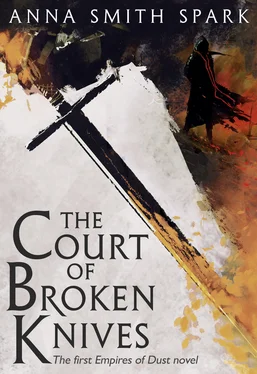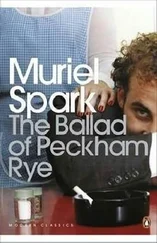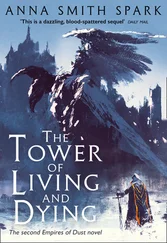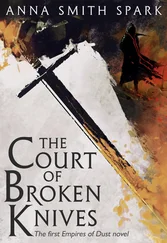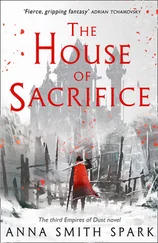I especially do not like the killing of children. They are so small, some of them.
But I have lived in the Temple all my life, been trained as High Priestess since I was five. It is all I have ever known and all I will ever know. For all my fine clothes and titles, I am a servant of the Temple, as surely as the women who scrub the floors. I am a tool of Great Tanis Who Rules All Things, His hands, His knife. You do not ask the women who scrub the floors whether they enjoy what they do. You do not ask your hand, or your knife. You see that they are necessary, and that they do what is needful of doing. You would not ask a soldier whether he enjoys his work. You would simply accept that in a war men must die and someone must kill them. If it is this man or that man who lives and this man or that man who is killed – well, that is war. Some must live and some must die. So I lived, and so others die. Another draw of the lot, it would have been reversed. Who am I to say it is wrong, or right?
There are two ways to die in Sorlost, if you seek death. The first is the white silks and the knife in the street, a brief glory of fighting and an unmarked grave. The knife-fighters are the heroes of the city, though they are nameless and forgotten as soon as they die. They walk the streets like corpses, already dead, waiting for someone to kill them, stealing women’s hearts. That is the way of young men, brave men, fools. The second is the Small Chamber and the altar stone, a noble sacrifice and the city’s gratitude that we may live and die for another few days without fear. That is the way of old men, sick men, women, children. Many that I kill are dying already, eaten up with disease or simply bored of their lives. They choose something good and noble in their dying. Or so we say.
My life is not all blood and sacrifice, besides. Most times, it is quite pleasant.
Four days out of ten, I officiate at the ceremony of the dawn. Helase hates it, for it means waking in the dark of the night to prepare, but to me it is worth the waking. I wear a robe of silver, that shimmers as I walk. The priestesses sing a hymn of praise so beautiful it makes the heart weep. I carry fresh flowers and place them before the High Altar, and the scent of them clings to my arms and my hair, the weight of them in my arms smears my skin with pollen and crushed petals and dew.
Other times I walk in the gardens or play with the children. They make me laugh, the little ones training to be priestesses; they look upon me with such awe. Only the very young ones, who have not yet drawn their lots, I avoid.
There is a fine library in the Temple: I read anything I wish. Poetry I especially enjoy, and histories. I have read several histories of the Temple and the High Priestess, which is curious. Reading about myself, it seems, for their lives can have been no different to my own.
Twice a year, at Year’s Renewal and Year’s Heart, we celebrate the Great Ceremony. Year’s Renewal is more sombre, Year’s Heart wilder and more joyful. The Emperor and all the great families come to the Temple shining with gold and jewels; the ceremony lasts for hours; the people of Sorlost dance and sing in the streets, gather outside the Temple to light candles and offer flowers. Afterwards, there are parties and banquets all over the city, and no one sleeps until the sun has risen the next day. Even we, in our cloister, have a fine meal and stay up to see the dawn, though we pray and sing rather than drink and dance. It is the one day of the year I am allowed to dine with the other priestesses. I wear a dress of cloth of gold for the ceremony, like the one I was dedicated in. It is heavy and stiff, but so very beautiful it pains me to take it off. I look like the High Priestesses from the old poems, Manora or Valdine. I look like a queen from an old book.
I have people I think of as friends: Helase, Ausa, even Samnel in her way. The woman who tends my rooms and helps me dress is kind and I talk to her of little things. I have people I suppose I would count as enemies, were I not what I am – Ninia, who talks of the old High Priestess-that-was as if everything I have done for the last five years has been failure and uselessness, as if the very way I kneel before the altar is wrong when compared to the way Caleste the High Priestess-that-was knelt; Tolneurn, the Imperial Presence in the Temple, who loathes the fact I do not have to do as he commands me, though he has never tried to command me and never will; one of the servants who serves the meals, who looks at me with hatred despite the fact I have never spoken to her.
Mostly, my life is as dull and repetitive as any other. I have seen old pictures of emissaries from half the world kneeling in the Great Temple, spellbound and trembling before the might of Great Tanis Who Rules All Things. Now I officiate to peasants and petty merchants, while foreign kings laugh at us for our beliefs behind fat fingers. Pointless, it seems sometimes. All the candles, all the gold and silver and bronze. Pointless, in the way most lives are pointless. A ritual motion we must go through, for want of anything else to do or believe.
But that is not true. It is not pointless. Nothing is pointless, as long as one is alive. One moment of beauty. One moment of happiness. One moment of pain.
Lives for living. Nothing less and nothing more.
‘Big, isn’t it?’
‘Fancy, too. Must be a real bugger to keep clean.’
‘I like the way it shines like that. Very pretty, that is.’
‘Seems a bit … over the top, though, really.’
‘Well, if you’re the richest empire the world has ever known, I suppose you need something to spend your money on. If you’ve exhausted your capacity for wine and women, might as well be a bloody massive wall made of solid bronze. Probably a slightly more useful way to chuck money away than just digging a big hole and burying it.’
Alxine gestured to a small group of ragged, thin-faced men hanging about in front of them. ‘They could have given it to the poor.’
‘What, and have them waste it by spending it on things?’
‘I’m slightly disappointed, to be honest. All you hear about it, I kind of expected it to be taller.’
The bronze walls of Sorlost loomed before them. Five times the height of a man, shining in the morning sun. They had no seams or joins, a perfect ribbon of metal twisting around the city, punctuated only by the five great gates. The Maskers’ Gate, the Gate of the Evening, the Gate of Dust, the Gate of Laughter, the Gate of the Poor. It was impossible to conceive who had built them, or how. They had never been breached: even Amrath Himself had dashed His armies to pieces against them to no avail and given up in despair.
Marith stood and gazed up at them in awe. It was still early, only a short while past dawn, and he could feel the cold radiating off them. In the heat of the afternoon, the sun beating down upon them, they must be hot as coals to the touch. The morning light flashed off them blindingly bright. Approaching from the east as the sun rose had been wondrous, the metal turning from inky dark to blazing fire, more beautiful and vivid than the dawn itself. The moment the light hit them had been like watching someone thrust a torch into a bowl of pitch. An explosion of light. Dragon fire. Joy. Hope.
There were no villages immediately outside of the city. No houses at all. The town where they had spent the previous night had been the last place before the gates, after that there was an hour’s walk through empty country, barren grassland and scrubby thorns. No wealthy villas or shanty towns of starving untouchables, just bare ground as though they were in the remotest part of some abandoned kingdom, and, rising before them, the great walls.
Читать дальше
